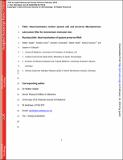Heat-inactivation renders sputum safe and preserves Mycobacterium tuberculosis RNA for downstream molecular tests
Abstract
The World Health Organization End tuberculosis (TB) strategy has called for development of- and increased access to- effective tools for diagnosis and treatment of TB disease. Mycobacterium tuberculosis (Mtb), the causative agent of TB is categorized as highly infectious agent. Consequently, diagnostic tests that involve comprehensive manipulation of specimens from presumed tuberculosis cases must be performed in a category three laboratory. We have evaluated the use of heat-inactivation to render TB samples safe to work with whilst preserving RNA for downstream molecular tests. Using Mycobacterium bovis Bacillus Calmette Guérin (BCG) cultures and TB positive sputa we show that boiling for 20 min at 80-, 85-, and 95- ºC inactivates all Mtb bacilli. The efficiency of inactivation was verified by culturing heat-treated and untreated (live) fractions of BCG and TB sputum for 42 days. No growth was observed in the cultures of heat-treated samples. In contrast the optical density of untreated BCG in Middlebrook 7H9 broth rose from 0.04 to 0.85 and the untreated sputa flagged positive at 3 days of incubation in Mycobacterium Growth Indicator Tube. Quantification of reference genes, 16S rRNA, tmRNA, pre-16S rRNA and rpoB by Reverse transcriptase quantitative polymerase chain reaction (RT-qPCR) showed minimal loss in estimated bacterial load. The loss was RNA-species dependent, <1log10, 1.1log10, 1.3log10 and 2.4log10 estimated CFU/ml for 16S rRNA, tmRNA, pre-16S and rpoB respectively. The RNA loss was independent of inactivation temperature. These findings show that heat-inactivation could obviate the need for category three laboratory to perform RNA-based testing of TB samples.
Citation
Sabiiti , W , Azam , K , Esmeraldo , E , Bhatt , N , Rachow , A & Gillespie , S H 2019 , ' Heat-inactivation renders sputum safe and preserves Mycobacterium tuberculosis RNA for downstream molecular tests ' , Journal of Clinical Microbiology , vol. 57 , no. 4 , e01778-18 . https://doi.org/10.1128/JCM.01778-18
Publication
Journal of Clinical Microbiology
Status
Peer reviewed
ISSN
0095-1137Type
Journal article
Description
The study was made possible by funding from the European and Developing Countries Clinical Trials Partnership (EDCTP) – Pan African Biomarker Expansion program (PanBIOME) grant SP.2011.41304.008. Support was also obtained the University of St Andrews School of Medicine research grant.Collections
Items in the St Andrews Research Repository are protected by copyright, with all rights reserved, unless otherwise indicated.

